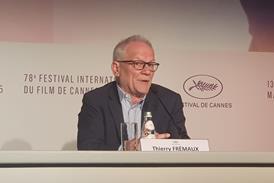The Arab world is poised to offer new kinds of storytelling, and Middle Eastern uprisings could help those uncensored voices be heard — that was the message at a Tribeca Film Festival panel on Monday.
The Doha Film Institute (which of course partners with Tribeca for the Doha Tribeca Film Festival) presented the panel discussion after a screening of Mahmoud Kaabour’s award-winning family documentary Grandma, A Thousand Times.
Kaabour [pictured] said that with the distance from 9/11, Arab filmmakers won’t be as focused on ‘answering up.’ “Now I think there will be much more strongly positioned narratives,” he said. “How these themes will be dealt with and received we don’t yet know.”
Cherien Dabis, director of Amreeka, agreed: “There’s a feeling that we’ll start looking at ourselves more critically which we couldn’t do before if we were defending ourselves.”
She remembered: “I felt like I was working against the world, trying to tell an Arab-American story after 9/11. Things have changed remarkably since then, there’s much more of an openness now.”
Richard Lorber, of US distributor Kino Lorber, noted that the ‘categories’ of world cinema exports were changing in the past decades — not only clearing the way for auteurs or films of extreme topicality anymore, but also finding a place for those ‘festival darling’ films that are sui generis works. He compared cinema from the Arab world now to how the industry formerly viewed Latin American cinema — as one homogenous group. But he expects each country or region to show its diversity going ahead, as Latin America has.
For instance, he noted that the new cinema coming out of Israel wasn’t all about the conflict, but was also “more domestic drama and comedies, and the first Israeli horror film Rabies [screening at Tribeca.]
Still, there are issues to face shooting in the region. Producer Sherif Mandour, who has Cairo Exit screening at TFF, told stories about working outside the system in Egypt — “If you have any kind of reality in your film, then you face problems in Egypt.” (He’s faced prison term for not having shooting permits.)
Kaabour also noted he ran into problems filming in his own grandmother’s house in Beirut without permits.
The uprisings across the Middle East also should inspire a new wave of filmmakers, the panel noted. Mandour said that eight short films shot in Tahrir Square in Egypt will be shown in Cannes this year. “That’s how it starts, from the freedom.” He explained that Egyptian cinema has been veiled by symbolism to bypass the censors, which is something that should be able to change in the future.
Mandour is planning a revolution-set film project now, a co-production with Tunisia, about two artists who met in the recent revolution.
Documentaries can also play an increasingly important role. Kaabour said: “I think the documentary form will enter its golden age,” building on the way that documentary footage helped fuel revolutions by going viral.
The group did caution that the revolutions going on don’t mean stable democracies immediately in the region, and censorship won’t change overnight (nor will self-censorship of artists used to dealing with the former regimes).
Grandma, A Thousand Times, which has been supported by DFI and won the audience award at the Doha festival, has been released theatrically in Beirut (notable for a documentary of this length). The team is now considering a “possible tour of universities, charities, and a few theatrical houses,” Kaabour said.




















No comments yet